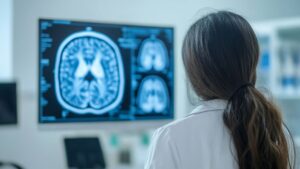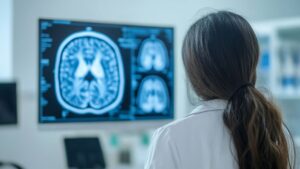

View Topics

Many patients aren’t sure which doctor to see when symptoms point to the brain or spine. Headaches, numbness, weakness, back pain, or memory changes can be frightening, especially when you don’t know which specialist can help. One of the most common questions is whether you need a neurologist or a neurosurgeon. The confusion makes sense…

Head injuries in elderly adults are never something to brush aside. What might look like a minor bump or brief fall can turn into a serious medical problem days later. Aging changes the brain, blood vessels, and recovery process in ways that make seniors far more vulnerable to complications after head trauma. Families often assume…

Chronic neck pain and chronic back pain are among the most common reasons people seek medical care. Many patients are told their discomfort comes from muscle strain, poor posture, or age-related wear and tear. While those factors can certainly play a role, they don’t explain every case. Pain that lasts for months, keeps coming back,…

Walking into a neurologist’s office for the first time can feel intimidating. You might be dealing with unexplained headaches, numbness, seizures, memory problems, or other concerning symptoms that have brought you here. The uncertainty of not knowing what’s wrong, combined with anxiety about the appointment itself, is completely normal. But here’s the good news: knowing…

When something suddenly feels wrong with your brain or nervous system, panic can set in quickly. Your vision blurs, your head throbs with unprecedented intensity, you feel numbness spreading through your limbs, or you experience confusion that wasn’t there an hour ago. In that moment of fear, one critical question dominates: where should you go…

Getting back behind the wheel after a stroke or seizure is a major milestone in recovery. But it’s not just about feeling ready – it’s about being medically safe and legally cleared. Every year, thousands of people face this challenging situation, wondering when they can return to their normal driving routine. The answer isn’t simple,…

Losing your balance or falling can be frightening, especially when it happens repeatedly. While occasional clumsiness is normal, frequent falls seen in neurology practice often point to underlying conditions affecting the nervous system. Balance problems aren’t just about getting older – they’re frequently warning signs that something deeper needs attention. Many people dismiss balance problems…

Cognitive decline affects millions of people worldwide, and early detection can significantly improve treatment outcomes and quality of life. Two of the most commonly used cognitive screening tests in clinical practice are the Montreal Cognitive Assessment test (MoCA) and the Mini-Mental State Examination (MMSE). But how do you know which one to use for your…

Millions of Americans suffer from chronic headaches that significantly impact their quality of life, health, and sleep. While headaches can stem from various causes, cervicogenic headache – a secondary type of headache – remains particularly underdiagnosed and misunderstood. Unlike primary headaches, it doesn’t originate in the brain but in structures of the neck, yet it’s…

Restless legs syndrome (RLS) has become a significant barrier to normal daily functioning and quality of life. People with this condition describe it as unpleasant sensations in the legs – often tingling, tension, or internal discomfort. These symptoms create an irresistible urge to move the legs constantly. Symptoms typically worsen in the evening or at…